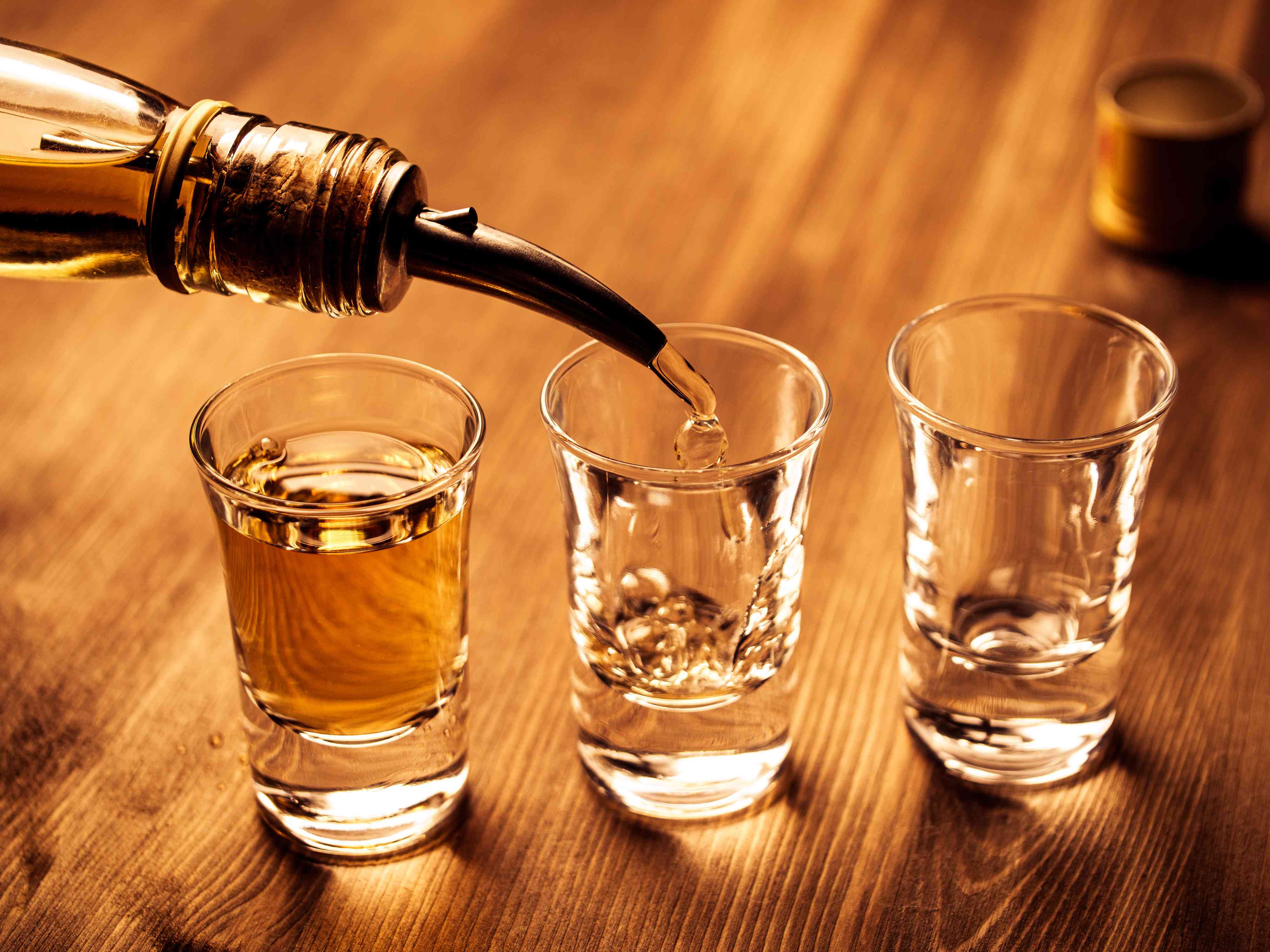Wait—Can Drinking Alcohol Really Prevent Food Poisoning? Experts said there's no strong evidence to recommend the practice, and that drinking may increase your risk of getting ill

A recent discussion on TikTok has led many to ask whether taking a shot can help prevent food poisoning
News Takeaway
- Recent TikToks have proliferated the myth that taking a shot of alcohol may help prevent food poisoning if you’ve eaten something bad.
- Experts say that’s not a fool-proof tactic—and it might even increase your risk of getting ill.
- Research on the topic is inconclusive, with small sample sizes and mixed results.
Can drinking alcohol help prevent food poisoning if you’ve eaten something suspicious?
That question has been circulating TikTok recently after one user posted a video in which they took a shot after eating possibly poisoned food. Their rationale? That research has shown drinking alcohol after eating iffy food might help prevent illness.
“What if you’ve just eaten some food that you’re now questioning if it was good or not and you’re worried about the possibility of food poisoning, which is my situation right now?” the TikTokker said. “If you are of legal drinking age and healthy to drink and you have consumed some food that you think may not be good, follow it up with a single shot of hard liquor and you will reduce your likelihood of getting sick.”
Is this a legitimate claim? Experts say there may be a kernel of truth to it—but the advice isn’t so clear-cut.
“Yes, alcohol as a substance can kill pathogens—think rubbing alcohol or hand sanitizer as a disinfectant,” Rabia De Latour, MD, a gastroenterologist at NYU Langone, told Health. "But drinking alcohol, which is known to cause harm to our health, should not be the go-to remedy to prevent food poisoning,”
In fact, drinking alcohol after eating food that hasn’t been prepared correctly may make things worse instead of better.
“We do use alcohol in hand sanitizers [and] for cleaning surfaces, but the environment of the stomach is completely different,” Christopher Counts, MD, emergency medicine physician and toxicology fellow at the New Jersey Poison Control Center at Rutgers New Jersey Medical School, told Health.
Here, experts explain what research has shown about how alcohol may affect your chances of getting food poisoning—plus what you should do if you think you’ve eaten bad food.

A_N / Getty Images
Can Drinking Alcohol Reduce Your Chances of Getting Food Poisoning?
Multiple studies have looked into the question of whether alcohol can prevent food poisoning, but the “findings do not mean alcoholic beverages should be recommended as a protective factor,” Counts said.
It's also important to note that the studies don’t prove anything definitively, De Latour added. “There are a few small, underpowered studies with conflicting data,” she explained.
A 2002 paper published in the journal Epidemiology looked at how people who drank alcohol after being exposed to Salmonella ohio fared compared to those who didn’t drink. The researchers concluded that those who drank alcohol were less likely to get sick, but the small sample size—only 51 people were included in the study—makes it hard to draw strong conclusions about the findings, experts said. “The authors even [wrote] in the study, ‘These findings do not mean that alcoholic beverages should be recommended as a protective factor against infectious food-borne diseases,’” Counts said.
Another small study published in Epidemiology in 1992 found that drinking beverages with an alcohol concentration of at least 10% was associated with “a protective effect” in people who had eaten contaminated oysters. But, again, the size of the study was limiting, experts said.
“There’s also been a proposed idea that certain things in wine are anti-bacterial, [which may be beneficial to people who have eaten poisoned food],” but this theory hasn’t been proven and therefore should not justify drinking wine to prevent illness, Counts added.
A 2001 study in Bioscience, Biotechnology, and Biochemistry looked at whether wine could kill Salmonella bacteria in mice, and the authors found that “wine was not effective in preventing food-borne diseases in vivo [in the mice].”
It’s also worth noting that even the studies that have linked alcohol consumption with decreased risk of illness haven’t proven that alcohol was the reason study participants didn’t get sick, Dr. Counts said. “It’s something we have to deal with [in studies] a lot—these correlations, associations, that are not necessarily causative,” he explained.
On the flipside, drinking alcohol may actually increase your chances of getting sick, especially if you’ve had more than the recommended amount, experts said.
“The latest U.S. nutritional guidelines recommend that women who choose to drink should not have more than one alcoholic beverage serving per day” while men shouldn’t have more than two, De Latour said. “Alcohol has numerous pathways for damage to our body when ingested in excess.”
How Long Does Food Poisoning Last?How to Prevent Food Poisoning
It might not be in your best interest to take a shot after eating food that wasn’t prepared correctly. But there are many known ways of preventing food-borne illness in the first place.
To avoid food-borne illnesses, the U.S. Centers for Disease Control and Prevention (CDC) says to:
- Wash your hands and clean all kitchen surfaces often.
- Cook your food to the correct temperature. A meat thermometer may help you ensure your meat gets as hot as it should before you stop cooking it.
- Refrigerate leftovers promptly, since bacteria can grow on food left out for too long.
- Avoid cross-contamination by keeping your food items separated in your kitchen.
Though taking a shot after eating contaminated food might not be the quick fix it’s been advertised as, these steps can help you stay safe from food poisoning.
“In this case,” De Latour said, “the risk to your body of over-ingesting alcohol outweighs any theoretical benefit of preventing illness.”
This story originally appeared on: Health News - Author:Maggie O'Neill


















